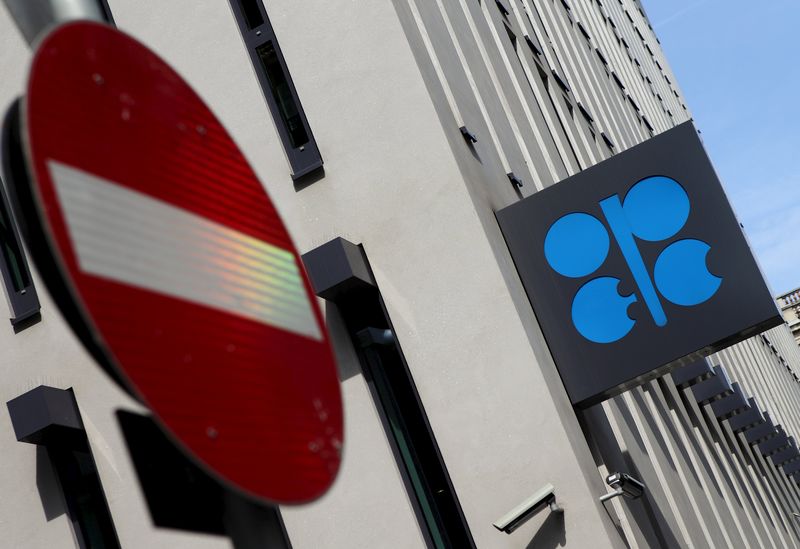Bitcoin set for a rebound that could stretch toward $100000, BTIG says
* OPEC+ cuts in May and June: https://tmsnrt.rs/2SsCSMN
* Nigeria, Iraq production: https://tmsnrt.rs/3aVRTgp
By Ahmed Rasheed, Alex Lawler and Ahmad Ghaddar
BAGHDAD/LONDON, May 6 (Reuters) - Iraq has yet to inform its
regular oil buyers of cuts to its exports, suggesting it is
struggling to fully implement an OPEC deal with Russia and other
producers on a record supply cut, traders and industry sources
said.
Less than full compliance by Iraq, as well as by smaller
producers such as Nigeria and Angola, could hurt the OPEC+
group's efforts to cut output by 9.7 million barrels per day
from May 1, equivalent to about 10% of world demand before the
coronavirus crisis led to a slide in consumption and prices.
Iraq, OPEC's second largest oil producer, has instructed its
biggest company, Basra Oil Co. (BOC), to cut output from May as
part of its efforts to reduce its output by 1 million bpd, or 1%
of global supply, an oil ministry source said.
But it has yet to agree an action plan with other oil
companies such as BP BP.L , Exxon XOM.N , Eni ENI.MI or
Lukoil LKOH.MM , which operate the biggest fields in the
country, a BOC spokesman said. "Talks with international oil companies are still continuing
to discuss ways of curtailing production that serve all parties
and ensure mutual interests are observed," the BOC spokesman
said.
"We can't say talks hit deadlock. We expect a breakthrough
to be reached soon."
Iraq's oil ministry could not be immediately reached for
comment. BP, Exxon, Eni and Lukoil declined to comment.
One industry source active in Iraq said the companies were
refusing the cut and that delays in forming a new government in
Iraq were complicating the discussions. "It's a mess at the moment," the source said.
OPEC Gulf states, including Saudi Arabia, Kuwait and the
United Arab Emirates, have informed their customers of cuts to
exports. Kuwait, Oman and the UAE have also officially informed
OPEC. Three trading sources said Iraq has not issued any such
statements to its regular oil buyers yet.
Two of the sources said Iraq's May export plans from the
south were broadly in line with April's at around 3.3 million
bpd.
There is no requirement for participating countries to tell
OPEC how they will make their cut, but informing customers about
their oil allocations is standard practice.
OPEC's Secretary General Mohammad Barkindo declined to
discuss individual country compliance: "We are now focused on
the full and timely implementation of this historic agreement,"
he told Reuters.
'DEADLOCK'
The challenge for many OPEC+ countries arises from how much
they are asking international oil companies (IOCs) to cut, said
Amrita Sen of analyst firm Energy Aspects.
"Beyond logistical shut-ins, some of the cuts needed from
Iraq, Nigeria and others when they have barely complied with
previous cuts are simply not going to happen," she said.
Companies producing in Iraq's southern oilfields operate
service contracts that pay them a fixed dollar fee for their
output and are also compensated in crude cargoes.
This type of contract shields oil companies against sharp
falls in oil prices. But it also means that with the OPEC cuts,
Iraq ends up with less crude to market itself.
"Most operators have told Iraq, they are happy for them to
cut but want their fees repaid in full. It is basically a
deadlock," said a source from one of the four companies.
Nigeria and Angola's current export schedules show they are
currently not cutting as much as required under the OPEC+ deal,
but will go further than they did under the previous OPEC+
agreement that ended on March 31. OPEC/O
Under the latest deal, Nigeria should cap production at 1.41
million bpd in May and June. But data from price reporting
agency Argus Media shows it plans to export 1.56 million bpd in
May and 1.65 million bpd in June, excluding the Akpo condensate
stream.
A trade source who has seen Nigeria's latest loading
programmes said that while Nigeria has made a significant cut to
its export plans in May, they will still fall short of the
pledged OPEC+ cut.
Nigeria's ministry of petroleum resources did not
immediately respond to a Reuters request for comment.
Export plans for May and June from Africa's second biggest
exporter, Angola, may also fall short of its OPEC obligations.
Angola's petroleum ministry and its petroleum regulator did
not immediately respond to a Reuters request for comment.
May volumes were retroactively cut back to around 1.27
million bpd and June export volumes are expected to be around
1.25 million bpd, loading programmes showed. These are both higher than the 1.18 million bpd production
level Angola has agreed to under the OPEC+ deal for the initial
two months.
<^^^^^^^^^^^^^^^^^^^^^^^^^^^^^^^^^^^^^^^^^^^^^^^^^^^^^^^^^^^
OPEC+ Cuts for May and June png https://tmsnrt.rs/2SpTHI8
Iraq, Nigeria Oil Production png https://tmsnrt.rs/2WfJ1gh
Iraq, Nigeria Oil Production https://tmsnrt.rs/3aVRTgp
OPEC+ Cuts for May and June https://tmsnrt.rs/2SsCSMN
^^^^^^^^^^^^^^^^^^^^^^^^^^^^^^^^^^^^^^^^^^^^^^^^^^^^^^^^^^^>
